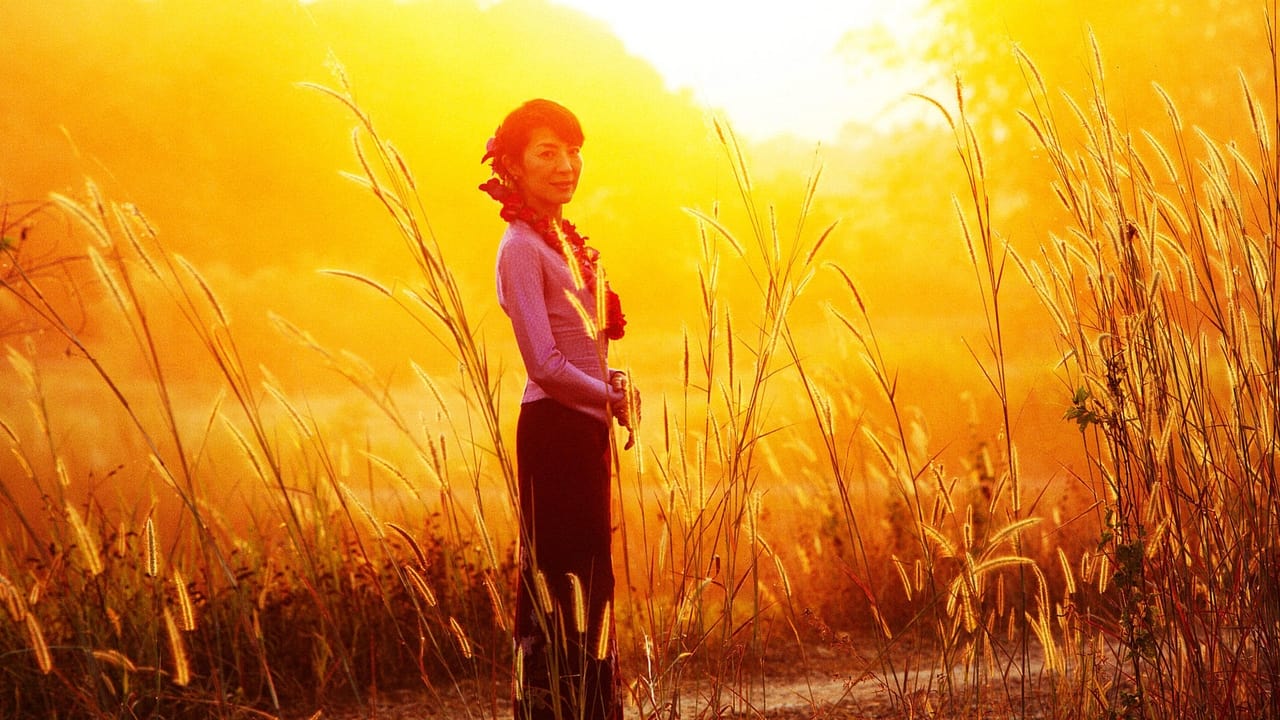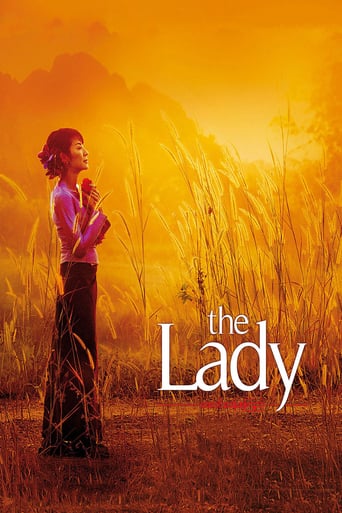

On the face of it, THE LADY has a lot going for it. Filmed mostly in Thailand, it tells the story of Aung San Suu Kyi's (Michelle Yeoh's) progress from happily married homemaker in Oxford, England, to the leader of the democracy movement in Burma (Myanmar) imprisoned by the military for fifteen years. The transition is not an easy one: the authorities try to make Suu's life as difficult as possible, by denying her freedom of movement and preventing her husband Michael (David Thewlis) from visiting her in Burman, even when he is dying with prostate cancer. Yeoh delivers a first-rate performance; her face remains expressionless in public, especially while confronting the generals and their lackeys who try every single strategy they can think of to break her down. Luc Besson's direction is both taut yet hard- edged; his handling of the crowd-scenes is especially good, particularly in the sequence where Suu addresses a band of pro-democracy demonstrators, but does not see the authorities taking off some of the demonstrators to prison at the back of the gathering. The scene where Suu wins the election, and her supporters gather at the gates of her house, only to be repelled by gun-toting soldiers, is also memorable. Yet the film as a whole is let down by Rebecca Frayn's clunky script, which is notable for its clichéd scenes - as, for example, when younger son Kim Aris (Jonathan Raggett) crawls into his father's arms at their Oxford home and says "I miss mum." Frayn's characterization of Suu is perfunctory: we get little sense of why she became such a celebrated figure resisting the military dictatorship, or what her politics actually were. The script is far more concerned with revealing her enduring love for her husband. As a result the film tends to focus on the minutiae of their domestic life rather than explaining the niceties of Burmese politics. Maybe that was not Besson's intention, but it might have made for a more intriguing film.
... View MoreThe movie should be watched because:1. It is based on a true story which should be told. 2. The movie teaches us that one people can inspire the world,and a group of dedicated people sooner or later can change the world. 3. Great things can be achieved but great sacrifices will be made. 4. Great acting. 5. For when we are standing in our righteousness,there is nothing to fear even death.Memorable quote: "Please Use Your Liberty to Promote Ours". Aung San Suu Kyi
... View MoreNobody should criticise the drama directing or entertainment value of a film like this which offers an intimate insight into the struggle of one human being to fulfil a humanitarian cause for her country, Mynanmar.Quite by chance, I watched WE yesterday, another love story with a twist directed by Madonna. As for the Lady, both Michelle Yeogh and David Threwlis are excellent throughout in the two leading roles. the film is as much about their devotion to their each other as it is to the cause of Burma (or Mynanmar if you like).What disappointed me was that there was no translation for whenever Burmese was spoken in the movie and so I had no idea what was being said. furthermore, the end credits were in French and I could not understand them either.Considering the political nature of the movie and the profile of the woman in focus, I thought it was a surprisingly unpolitical film and the Burmese Generals came across as a bunch of puffs who had no idea to connect with the people they ruled and controlled.I also agree that the ending was rushed after Mikeys death and more time could have been spent to balance the story to the present day but that is the directors prerogative and I am not criticising in any way.I remember the Ghandi movie and as much as I liked this movie, sorry, the overall quality of this movie cannot be compared to Ghandi.Terrific film, have a few hankies at the ready and be ready to grab a hand or two when things taken a sudden turn!
... View MoreSince 1905, there have been 15 women Nobel Prize winners (three sharing in 2011). The loftiest stature has to be attributed to Mother Teresa. Aung San Suu Kyi, "The Lady" comes very close behind. Luc Besson, generally not exactly known for his modesty, intimated in an interview how humbled he was in his first meeting with her in her house in Burma, coming face to face with Goodness personified. Luc Besson is well known for his appetite to tackle ANY genre (from historical epic to outlandish science fiction, and everything in between), and he has well demonstrated his virtuosity and flare. Filming the story of such a living legend as Aung San Suu Kyi, however, he is somewhat subdued. This is understandable, because of the respect. Uncharacteristically restrained in his visuals, he wisely takes advantage of Eric Serra's excellent original score, to wonderful effects. As well, rather than focusing on heroism in political struggle, he leans more towards presenting a moving mature love story that elevates the word sacrifice to a new height. Absolutely everything hinges, however, on the titular role. Although not many people may know, Michelle Yeoh has long proved that there is much more to her than a premium Amazon, with "The Soong Sisters" (1997). It didn't take long for people trying to cast the role of Aung San Suu Kyi to unanimously agree that Yeoh was born for it. And she is proved them right, convincingly. Her job is exceptionally difficult when you compare it with a majority of successful bio pics in the last decade, where the protagonist is literally history (Ray Charles, Bobby Darin, Truman Capote, J. Edgar Hoover ). Aung San Suu Kyi is in every sense a living legend. People see her frequently in live coverage. The courage and determination is probably quite similar in all heroic figures. But the grace and elegance of "The Lady", even under the acutest of pressures, is unique. Yeoh's portrayal is absolutely flawless, putting her in the same class as Helen Mirren's Queen Elizabeth II and Morgan Freeman's Nelson Mandela. Yeoh's performance, however superb, would not shine as bright without the other half of this love story referred to earlier, or, as one critic aptly calls it, "a story of the man behind the woman". Cannes's Best Actor (1993) David Thewlis is with Yeoh every step of the way in portraying her "most indulgent husband" Michael Aris who does not just support unwaveringly his wife's dream of a free Burma (which would have been remarkable), but embraces it as his own. But there's not just the love between husband and wife, but also love in a happy family, including the two sons Alexander (Jonathan Woodhouse) and Kim (Jonathan Raggett). The most touch scene would have to be the father and two sons receiving the Nobel Prize for the mother who is held in house arrest in Burma - Aung San Suu Kyi listening on the radio to Alexander's acceptance speech on her behalf. That is when it become quite difficult to contain one's tears.
... View More